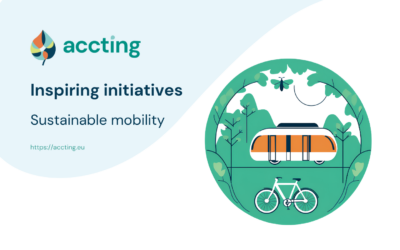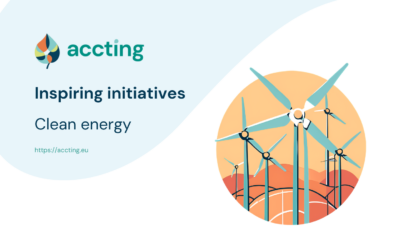From hand-me-down bikes to a city-wide shift: How EduMove is changing how Tirana’s kids get to school
In the suburbs of Tirana, where cycling was once seen as a sign of poverty or a relic of the past, a quiet revolution is taking place. A non-profit organisation is helping schoolchildren reclaim the streets, not with flashy campaigns or expensive equipment, but with donated bikes, grassroots training, and a bold belief in change.
Launched by Active Mobility, the EduMove project has one goal: to get kids moving safely, confidently, and sustainably. And it’s working.
“EduMove enabled school-age children from outer communities in Tirana to cycle to school through bike donations, trainings, and safe infrastructure (bike racks and bike corridors),” explains Iden, a cycling activist turned project lead.
In just a few months, five schools went from having no students cycling to school to 18% making the journey on two wheels.
”One key achievement we’re most proud of is increasing the number of students cycling to school from 0 to 18% across five schools — marking a cultural change toward active, independent mobility.”
It may sound like a small number. But in a city where bikes are often dismissed as outdated or low-status, that shift reflects something bigger: a reimagining of what’s possible for youth mobility and for the city itself.
Among the many students impacted by the project, one story stood out.
“One moment that really stayed with me was seeing Migena, a shy girl who had never ridden a bike before, not only learn to cycle during our training but later become our first student to be hired by the organisation — proof that empowerment through mobility can lead to real opportunities.”
The project wasn’t without challenges. Delays in receiving approval from the Ministry of Education caused early setbacks. “We overcame it by using the time to build stronger relationships with school staff and prepare high-quality training materials.”
Another hurdle came when students discovered the donated bikes weren’t brand new. “Many were disappointed… but with a very limited budget, we provided the best quality used bikes available and offered free repairs to ensure they felt valued and supported.”
What surprised the team most wasn’t the resistance, it was how quickly things turned around.
”Once a few confident kids started biking to school, it created a ripple effect, inspiring their classmates, siblings, and even parents to reconsider bikes as a real transport option.”
Over half of the participants were girls, many of whom had never cycled before. Their growing confidence began to shift long-held perceptions about gender and mobility within their schools.
Collaboration was at the heart of EduMove. “Partnerships with schools, the Municipality of Kamëz, local bike shops, and community members allowed us to deliver training, install infrastructure, and create a support system that made cycling both possible and sustainable for the students.”
Some of those students became more than just participants. “We chose to focus on the ones who caught the ‘cycling spark’. We kept in close contact with them, invited them to events, gave them opportunities to speak up and lead.” That enthusiasm proved contagious.
”In more than one case, we saw hesitant peers become curious, and parents begin supporting cycling as a daily routine.”
Looking ahead, EduMove’s momentum shows no signs of slowing. “We see EduMove continuing through two main paths: integrating cycling education into the national school curriculum — starting with grades 4 and 5 — and expanding the model to other schools and even universities, with support from local partners and new funding opportunities already in the pipeline.”
The team believes the model could work well beyond Tirana, especially in other areas where young people face mobility challenges. “But the bike donation component is quite unique and emotionally impactful,” Iden adds. “Any replication would need to ensure a strong local commitment to sourcing bikes and maintaining that personal connection with each recipient.”
During the project, the team observed a sharp divide in students’ attitudes. “Many associated bikes with poverty or saw cycling as unsafe and unfashionable — a mode of transport they felt society had outgrown.” Others, however, embraced the experience with enthusiasm.
”The sense of freedom and confidence it gave them was transformative.”
By focusing on this group, and helping them become visible within their communities, the project created a ripple effect that continues to grow.
EduMove is proof that with the right mix of trust, tools, and training, a second-hand bike can carry a child much further than just to school. It can lead to independence, leadership and a cultural shift on wheels.
This initiative is one of ten pilot projects funded by ACCTING to support the reduction of social inequalities in relation to the Green Deal.


